Hyundai Elantra (2004)
 |
||
 |
 |
 |
|
|
|
|
The Koreans are now moving solidly into the American marketplace just as the Japanese did in the 70's and 80's. The Koreans are moving faster, staking their claims on the basis of low price and superb warranties. And anyone looking above all else for value, now needs to at least consider one of the Korean makes. The 2004 Elantra is Hyundai's competitor for the Honda Civic: compact, but not tiny, basic transportation. The starting list price is $13,300 which is not, remarkably, Hyundai's least expensive car. (That distinction goes to the Accent, which has a suggested price of $10,000, believe it or not.) The Elantra is available in three trim levels, |
|
|
|
|
 |
There was some disagreement in the ranks about the Elantra's driving experience. While everyone agreed that it's absolutely acceptable in all regards, Tommy found it particularly fun to drive. He tooled around Boston in it, and found it peppy and damn near sporty. We had to pry the keys out of his hands when it was time for the car to go back to Hyundai. Of course, Tommy is now at the age where he considers shuffleboard a major sporting event. Our Producer, Doug Berman, found the Elantra's suspension a bit on the soft side, more tuned to emphasize driving comfort over crisp handling. He liked it around the city, where it did a decent job swallowing up pot holes and bumps, but thought it inspired less confidence on twisty roads and at highway speed, where its light weight and tendency to lean in corners made him nervous.
The Elantra's 138 horsepower four-cylinder engine is more than adequate for this car. Everyone agreed it was quick off the mark, and had plenty of pep. Tommy liked it so much he put on his driving helmet (the one that says "crash test dummy" on it). One point of serious concern for us: the Elantra got a "poor" rating on offset crash tests conducted by the Insurance Institute for Highway Safety, compared to "acceptable" or "good" for many of its competitors. That factor, alone, would be reason enough for us to tip the balance towards, say, a Honda Civic. |
|
|
|
 |
|
|
|
|
 |
|
|
|
|
 |
|
|
|
|
 |
As with all of the four-cylinder Hyundais, this car is very easy to service. It's simple to work on, and there are very few special tools required. Servicing is certainly within the range of your average, local independent shop. |
|
|
|
 |
The Elantra comes with Hyundai's remarkable, 10-year or 100,000-mile warranty on the powertrain, which covers key engine and transmission components (although not all of them). The rest of the car is covered by a five-year or 60,000-mile warranty, which alone is better than most. Whether the car is reliable or not (and it's probably at least average), Hyundai is doing a great job of standing behind it. Hyundai is taking the risk here so you don't have to. They're saying, try our cars, we'll fix them if they break. And while it's inconvenient to have things break, you'll feel a lot better when things get fixed for free. |
|
|
|
 |
So Hyundai is selling value. Lots of standard equipment, a low price, and a great warranty. Folks who are looking for a small, jack-of-all-trades car for commuting or use around town and occasional longer trips would be wise to at least consider the Elantra, along with traditional market leaders Honda and Toyota. It's a decent car and a helluva deal. |




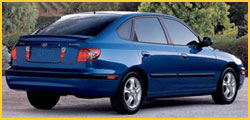 a GT five-door hatchback, and two, four-door sedans, the GLS and the GT.
a GT five-door hatchback, and two, four-door sedans, the GLS and the GT. 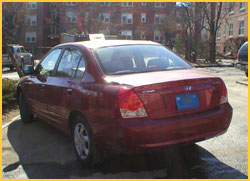 The model we drove had a five-speed manual transmission. With only 2,000 miles on the odometer, the supposedly self-adjusting clutch already felt a little out of adjustment, although that may not be the car's fault. It's possible that the other reviewers (read: animals) who drove this car before us weren't exactly treating it with the utmost respect, if you catch our drift. It's also possible that the clutch in the Elantra is a little bit "under-designed" and not up to taking any serious abuse. (Read: Not a car you're going to race on the weekends.)
The model we drove had a five-speed manual transmission. With only 2,000 miles on the odometer, the supposedly self-adjusting clutch already felt a little out of adjustment, although that may not be the car's fault. It's possible that the other reviewers (read: animals) who drove this car before us weren't exactly treating it with the utmost respect, if you catch our drift. It's also possible that the clutch in the Elantra is a little bit "under-designed" and not up to taking any serious abuse. (Read: Not a car you're going to race on the weekends.)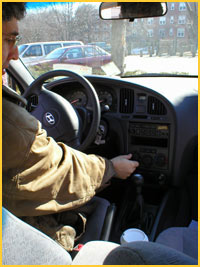 This is a compact car. It's not a Grand Marquis. That said,
This is a compact car. It's not a Grand Marquis. That said, 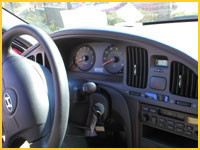
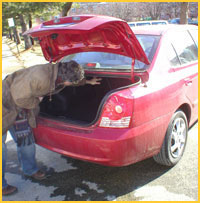 Styling is fine.
Styling is fine. 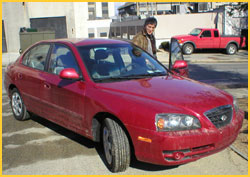 The Hyundai should prove to be reasonably reliable.
The Hyundai should prove to be reasonably reliable.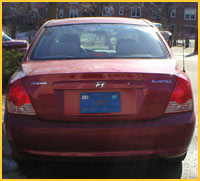 The main competitor for the Elantra is the Honda Civic. And interestingly, we just drove a Honda Civic that sold for about the same price. (The base model Honda DX four-door is $13,010.) The Honda clearly felt more solid and substantial, and felt firmer on the road. It also has a well-deserved, superb reputation for reliability.
The main competitor for the Elantra is the Honda Civic. And interestingly, we just drove a Honda Civic that sold for about the same price. (The base model Honda DX four-door is $13,010.) The Honda clearly felt more solid and substantial, and felt firmer on the road. It also has a well-deserved, superb reputation for reliability.